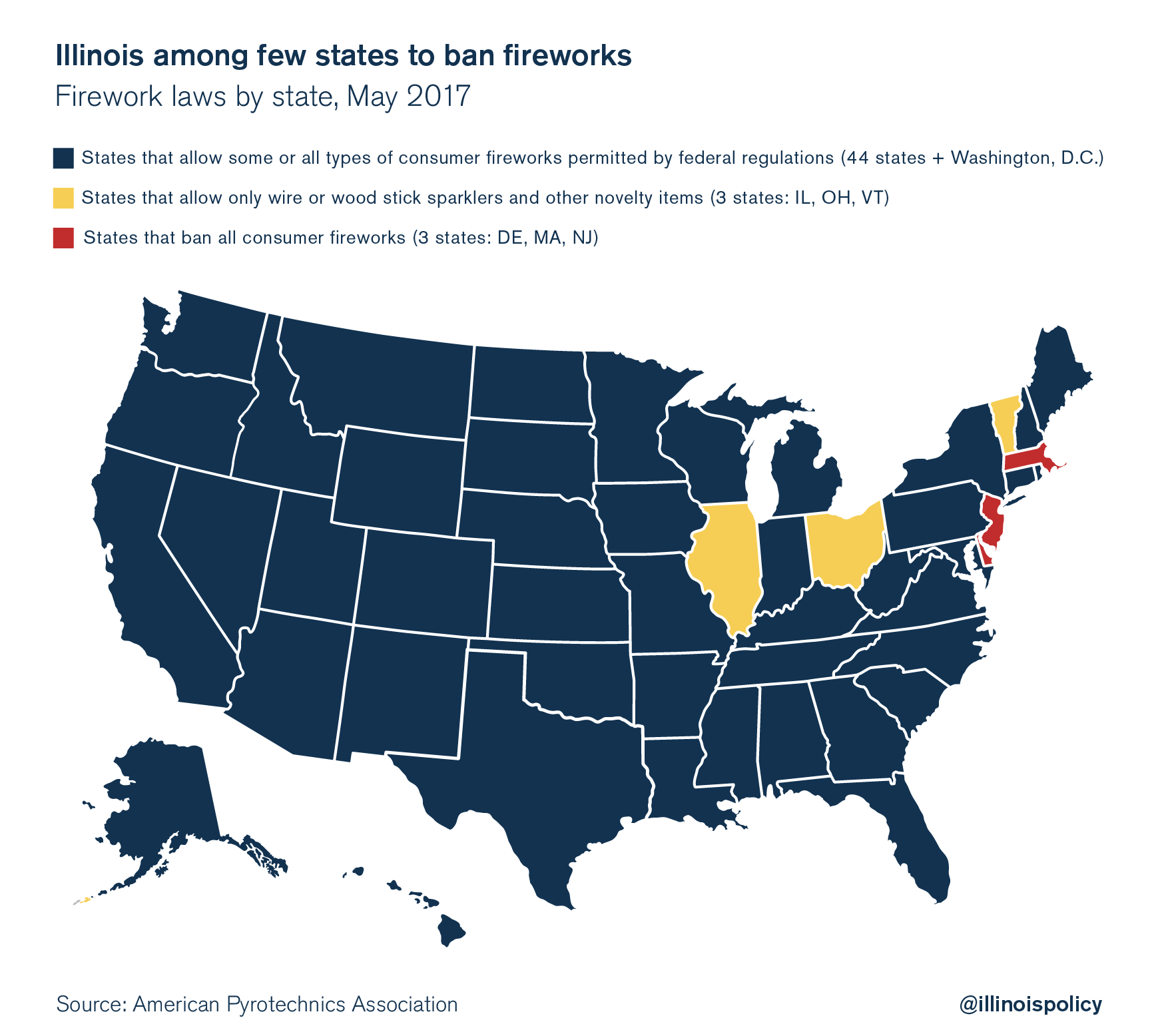It’s time Illinois legalized fireworks
The Land of Lincoln is one of only six states to impose harsh restrictions on the sale and possession of fireworks.
As long as Americans have celebrated their independence, they’ve done so with fireworks.
The day before signing the Declaration of Independence, John Adams opined that Independence Day was to be celebrated “with Pomp and Parade, with Shews, Games, Sports, Guns, Bells, Bonfires and Illuminations from one End of this Continent to the other from this Time forward forever more.”
Good luck buying any of those “illuminations” in the Land of Lincoln.
Illinois is one of only six states in the country that bans fireworks for a vast majority of its residents.
Illinois’ Pyrotechnic Use Act bans the sale, use and possession of most consumer fireworks, including bottle rockets, roman candles and firecrackers.
But the law says you can buy sparklers. Yippee.
Light up a roman candle and you risk punishment of up to one year in prison and a $2,500 fine. But enforcement is laughable. Communities from Chicago to Cairo will be filled with the same rockets and red glare as Anywhere, USA.
The ban is embarrassing. Residents in every one of Illinois’ neighboring states are free to buy fireworks.

And that wasn’t the case just a few months ago. Not until Iowa legalized the sale and use of consumer fireworks in May. Sen. Jeff Danielson, D-Waterloo, called Iowa’s nearly 80-year-old fireworks ban the “silliest law ever,” according to The Gazette.
Here’s part of the reason why: Fireworks store parking lots across state lines fill up with Illinois license plates year after year. Kris Zambo owns one of those stores, Dynamite Fireworks in Hammond, Indiana. He said more than half of his customers come from Illinois.
“Hundreds of people in Northwest Indiana work in the fireworks industry,” Zambo said. “I put myself through college working in fireworks.”
Instead of spending money in their own communities, Illinoisans go to Zambo. And the state loses out on jobs and tax revenue.
Indiana has taken in about $2.5 million in tax revenue every year since it loosened fireworks laws and leveed a 5 percent fee. Iowa expects to gain $1.5 million in its first year of legalization.
Zambo said his industry has seen double-digit growth every year since Indiana reformed its fireworks laws in 2006, and more than half of his customers come from Illinois.
Indiana and Iowa are part of a strong trend toward fireworks legalization nationwide.
Since 2011 alone, Kentucky, Utah, New Hampshire, Michigan, New York, Georgia and West Virginia have all lifted restrictions on the sale of most types of consumer fireworks.
Of course, talk of loosening fireworks restrictions is met with safety concerns. More fireworks mean more injuries, right?
It’s not so simple. Despite a dramatic increase in fireworks consumption between 2001 and 2016 – and fewer restrictions in many states – the U.S. didn’t see a spike in people heading to the emergency room for fireworks-related injuries, according to research from the U.S. Consumer Product Safety Commission, or CSPC.
“I think safety is the best argument [for legalization] in Illinois,” Zambo said. “Because it’s been legal in Indiana for 10 years, safety’s improved. People are buying quality products and getting good advice.”
Scale is also a question.
The CSPC reported 11,100 emergency room visits due to fireworks in 2016. But nearly 8 times as many people head to the hospital each year because of lawnmowers.
Illinois state Sen. Chapin Rose, R-Mahomet, introduced a bill in 2015 that would have legalized some of the fireworks currently banned under state law – and levied an additional 3.75 percent sales tax upon them.
It didn’t even get a hearing in committee.
Lawmakers can and should end Illinois’ paternalistic fireworks ban. The law cuts off fair access to the fruits of a huge industry.
And more importantly, it limits the personal freedoms long celebrated by bringing light to dark prairie skies.
